274 Products
-
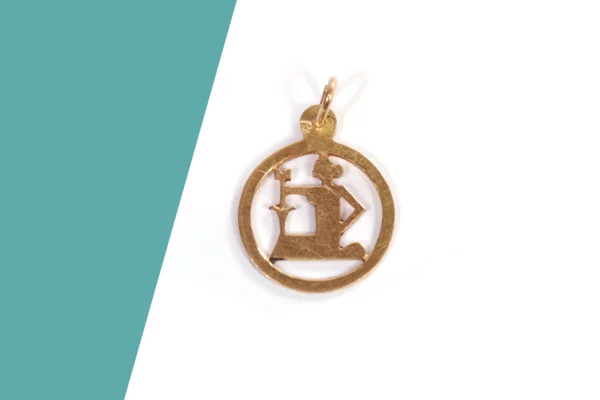
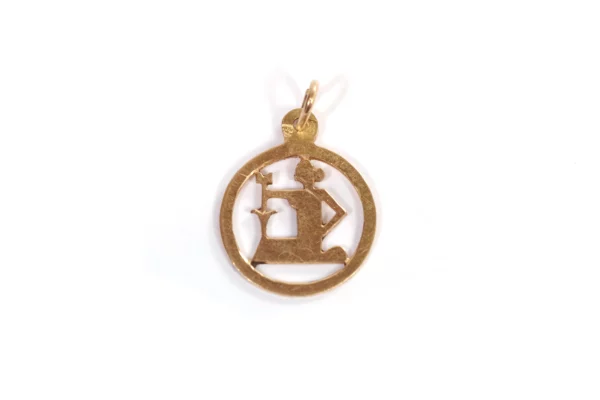 120,00€
120,00€Small pendant in gold. Pendant in 14-karat rose (585) depicting a kneeling woman, planting an arrow, or perhaps a flower.
Shell hallmark, 585 hallmark and another illegible hallmark.
Dimensions (including the bail): 18 mm x 12 mm
Note : unfortunately, we have not found the iconography related to this representation.
Condition: scratches from use
Weight: 0.51 gr
-
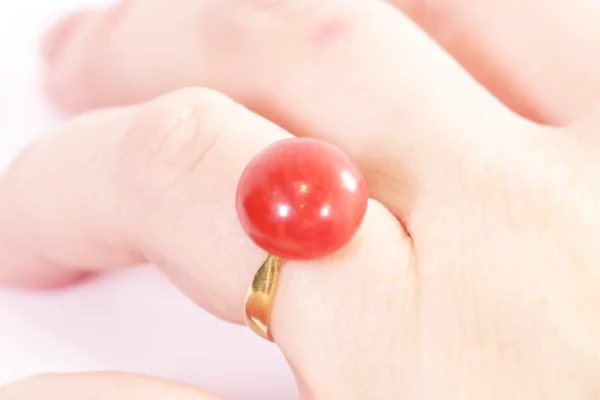
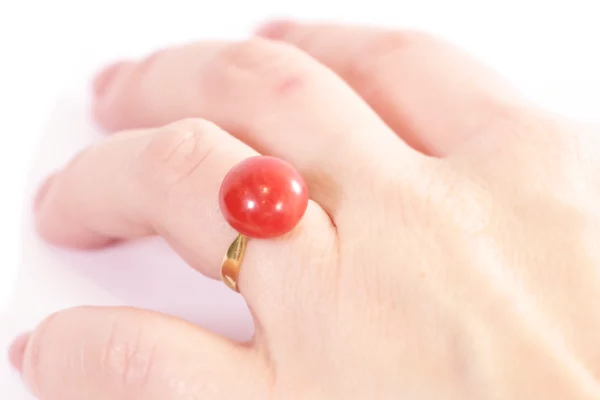 540,00€
540,00€Edwardian coral ring in 18-karat rose gold (750). The ring is adorned with a large round cabochon of dark orange coral. The coral displays visible “flame” growth lines, apparent to the naked eye and typical of this gem. The ring’s band is simple, with only a few chiselings under the cabochon, revealing a floral motif. Antique ring, early 20th century.
Eagle head hallmark (french state hallmark for 18 karat gold)
Finger size: 46 EU or 3.5 US (resizing possible)
Dimensions of the coral cabochon: 12 x 7 mm
Weight: 3.04 g
Gemology note: Coral is an organic gem. Only the branched limestone trunks of certain corals are used in jewelry. Its color is due to organic pigments close to carotene: ranging from blood red to white, passing through “angel skin” pink. Currently, most coral species are protected by CITES, the Convention on International Trade in Endangered Species of Wild Fauna and Flora.
-
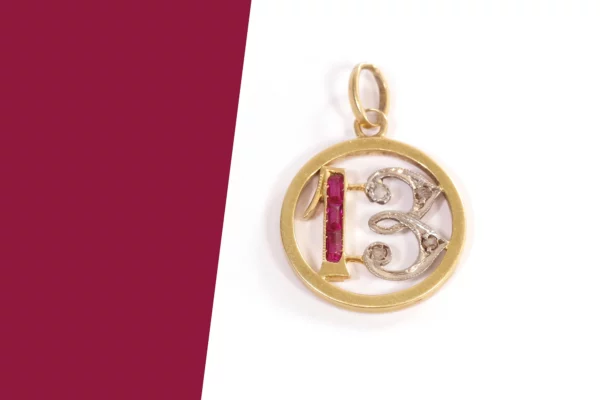
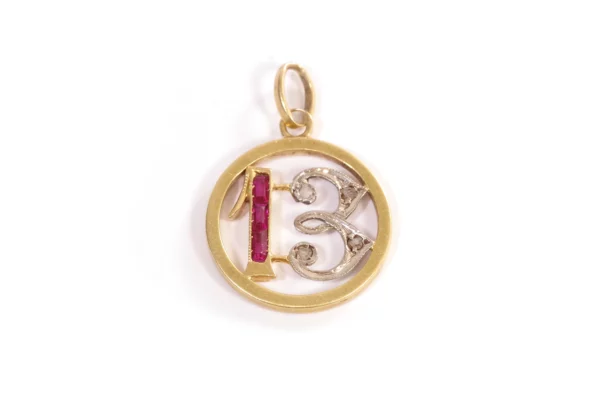
950,00€850,00€Art Deco Edwardian pendant 13 in 18-karat rose gold (750) and platinum. Lucky charm pendant featuring the number 13 at its center, set with 3 synthetic rubies and 4 rose-cut diamonds. These small lucky charm medallions were fashionable in the early 20th century, during the Art Deco period, around 1920-1930.
Traces of an eagle head hallmark
Dimensions (including the bail): 21 x 10 mm
Note : watch the video to get an idea of the size.
Condition: scratches from useWeight: 0.96 gr
-
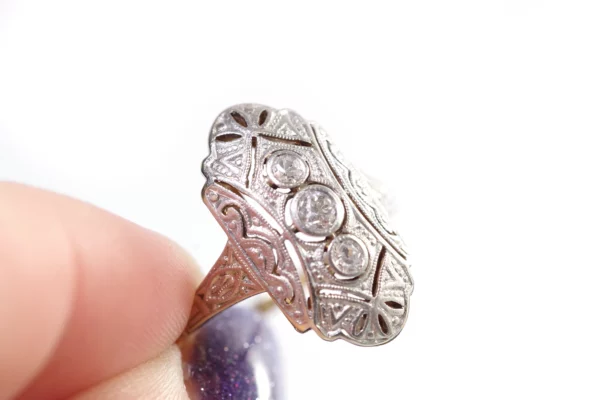
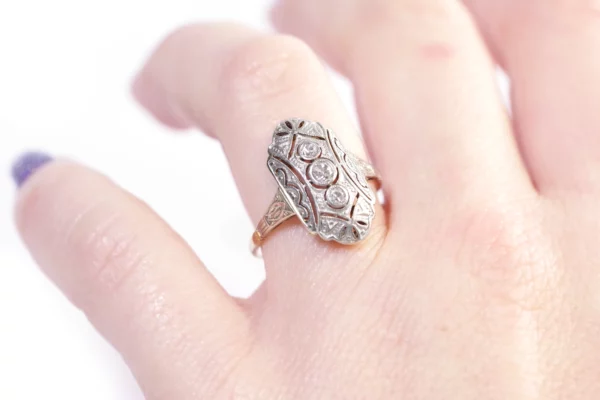 900,00€
900,00€Art Deco diamond ring in 14-karat gold (585) and platinum. Hexagonal Art Deco ring set with three old mine cut diamonds in a bezel setting. The ring is elegantly decorated with geometric lines and openwork motifs, typical of the Art Deco period. Antique ring, Italy, circa 1925.
Shell hallmark (French State hallmark for 14-karat gold)
Finger size: 52 EU or 6 US (resizeable)
Dimensions of the setting: 18 x 10 mm
Estimated weight of the central diamonds: 0.15 ctCondition: fine scratches from use
Weight: 2.22 gr
-
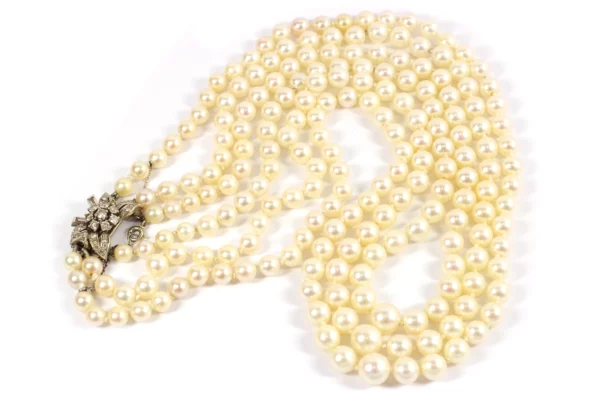
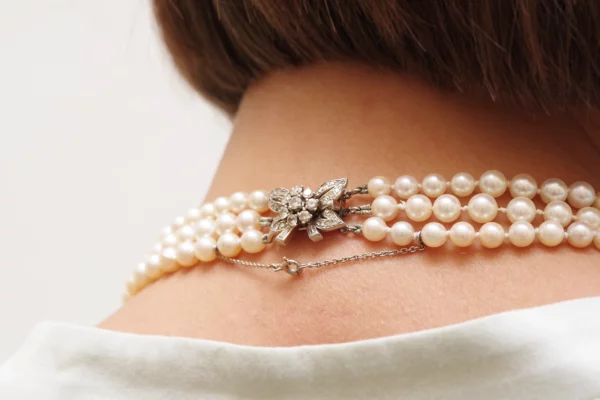 1900,00€
1900,00€Three-strand pearl necklace with 18-karat white gold and diamond clasp (750 hallmarked). This vintage “American-style” necklace features three strands of cascading white cultured pearls. The necklace is adorned with an 18-karat white gold clasp in the shape of a knot, fully set with round brilliant-cut, baguette-cut, and 8/8-cut diamonds (33 diamonds in total). The main diamond weighs 0.10 carats. Each strand consists of 63, 69, and 77 pearls, respectively. Dating back to the 1970s, made in France.
Hallmarks: Eagle’s head (French state hallmark for 18-karat gold), 750 (indicating 18-karat gold), and maker’s mark.
Length: 48.5 cm
Clasp dimensions: 16 x 20 mmEstimated total diamond weight: 0.61 carat
Pearl diameters: 5 mm (minimum) to 8.5 mm (maximum)Note: The clasp features an 18-karat white gold safety chain. The necklace has been restrung.
Condition: Slight damage to one pearl near the clasp.Weight: 86.40 gr
-
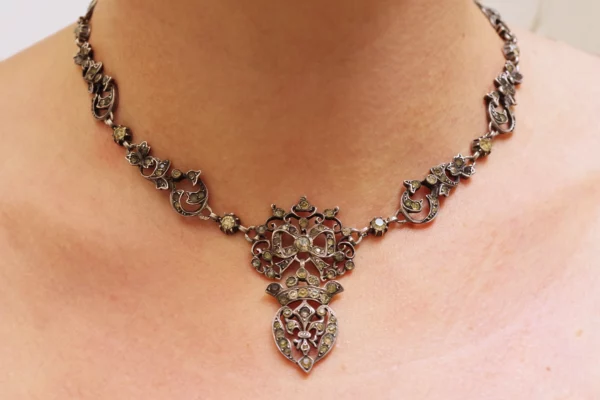
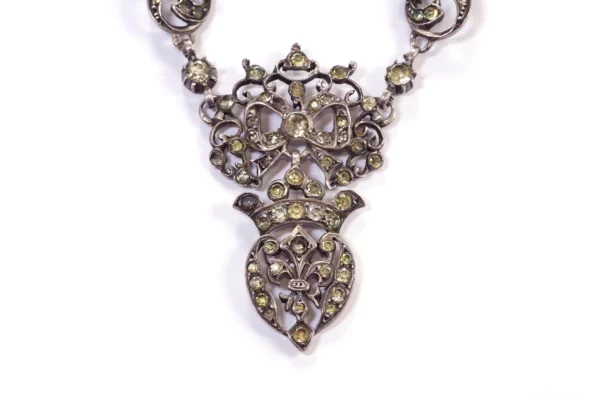 780,00€
780,00€Antique French regional necklace in 800 silver. It consists of links adorned with faceted rhinestones in volute motifs. The necklace features a central motif in the shape of a crowned heart with a fleur-de-lis design, topped with a bow. The entire piece is set with white and slightly yellow rhinestones (color alteration due to age). The necklace fastens with a lobster clasp, which was added later, as these necklaces originally closed with ribbons. This antique regional French necklace likely originates from Normandy and dates back to the mid-19th century in France.
Hallmarks: Swan.
Total length of the necklace: 39 cm.
Dimensions of the central motif: 50 mm x 30 mm.
Condition: signs of use, added clasp.
Weight: 48.06 gr
*The antique box is not sold with the jewel*
-
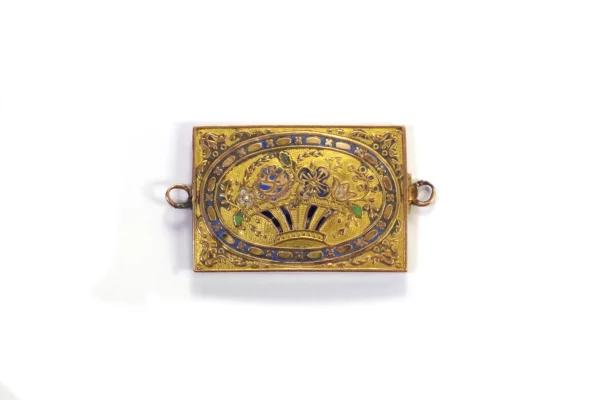
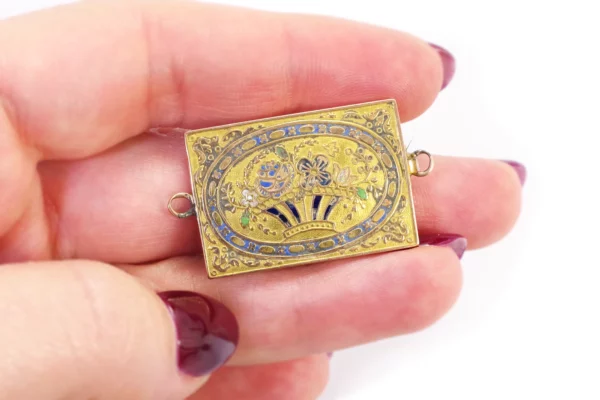 900,00€
900,00€Large French regional clasp in 18-karat rose gold (750) and 14k gold (for the clasp ring). This large Normandy clasp is made of hollow gold. It is richly decorated with colorful enamels. On one side, three partially enameled flowers blossom in the center of the clasp within a cartouche. The cartouche is surrounded by a frieze of dots and semicircles. On the other side, a flower basket composed of pansies, wheat, a rose, and a tulip is featured within a blue enameled cartouche. The presence of pansies is typical of the iconography of sentiment jewelry from the early 19th century, signifying “think of me.”
This Normandy regional clasp is a French sentiment jewel from the early 19th century.
Shell hallmark for standing clasp ring
Clasp Dimensions: 35 mm x 19 mm.
Condition: Scratches from use, missing enamels, slight indentations.
Weight: 3.30 gr
-
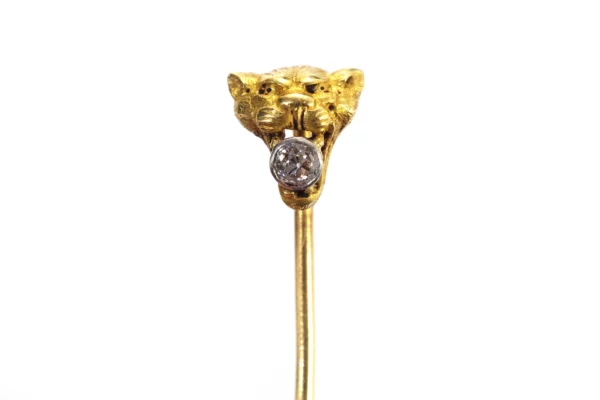
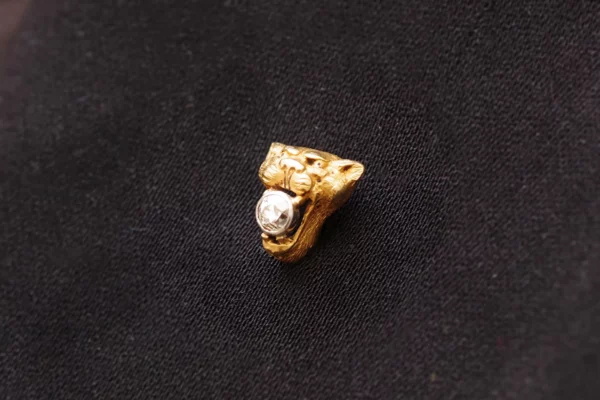 620,00€
620,00€Edwardian lioness tie pin in 18-karat yellow gold (750) and platinum. It features the head of a lioness with an open mouth, holding an old mine cut diamond set in a closed setting. The lioness’s head is intricately detailed, showcasing its fur. The realistic naturalistic craftsmanship of this piece is quite exquisite, reminiscent of pins designed by René Boivin around 1906. Edwardian period.
Owl and mascaron hallmark (French State hallmark for 18-karat gold and platinum)
Dimensions: 70 mm x 9 mm.
Estimated diamond weight: 0.08 carat.
Note: The pin comes with a stopper to secure it.
Condition: Light signs of wear.Weight: 2.65 gr
-
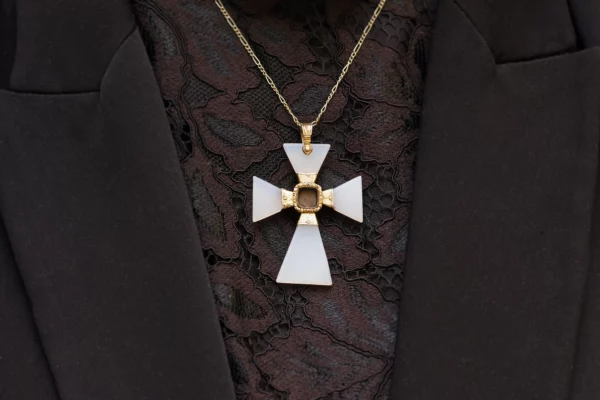
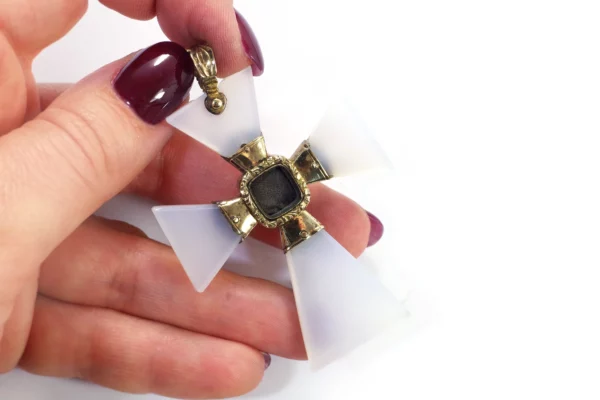 700,00€
700,00€Georgian Maltese cross chalcedony pendant in 9k gold. This antique reliquary cross is made of four chalcedony elements forming a cross, held together by a central gold element with delicate engraving. This central element likely originally contained a woven lock of hair beneath glass, although it is no longer present. The pendant has an intricately decorated bail. This Georgian cross t is from around 1820.
Trefoil hallmark
Dimensions: 60 x 34 mm.
Note: Similar Georgian Maltese crosses can be seen in the Victoria & Albert Museum in England.
Condition: Missing the central protective glass, some oxidation.Weight: 11.26 gr
*The antique gold chain is not sold with the jewel*
See our antique chains -
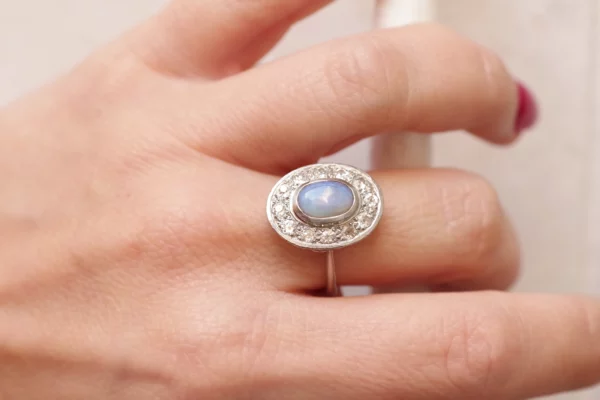
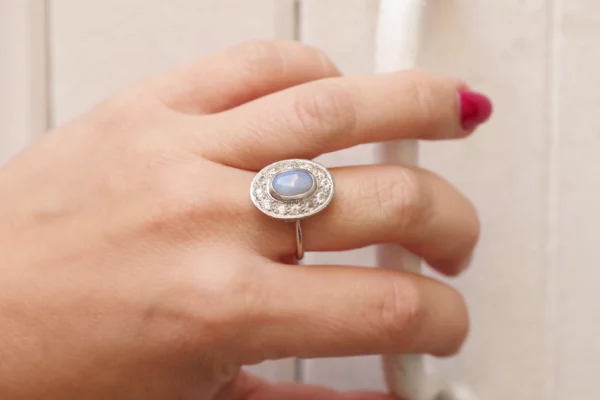 2000,00€
2000,00€Art Deco cluster opal ring in platinum (950). This antique cluster ring features a central cabochon-cut opal set in a close setting, surrounded by twelve old-cut diamonds. The opal shows vibrant play-of-color with shades of violet, blue, and green, accented by hints of orange. The ring’s gallery is delicately detailed with scrollwork. This Art Deco period ring dates to circa 1930 and originates from France.
Hallmarks: Dog’s head (french hallmark for platinum) and maker’s mark.
Ring Size: 51 EU or 5.75 US (Resizable).
Top dimensions: 18 x 14 mm.
Opal weight: 1.03 carats.Estimated total diamond weight: 0.48 carats.
Condition: surface abrasions, signs of wear.
Weight: 8.18 gr
Gemology and beliefs: Opals come in various types, with noble opals being the kind that exhibits play-of-color. This captivating effect is caused by tiny, uniformly sized spheres of silica. When light hits these spheres and is refracted, it produces a dazzling display of colors on the opal’s surface. In contrast, common opals lack this play-of-color, as their spheres are disordered and of varying sizes, giving them a milky appearance. Opals have been associated with the power of invisibility in folklore, earning them the title “Patronus forum” (patron of thieves) during the late Middle Ages.
-
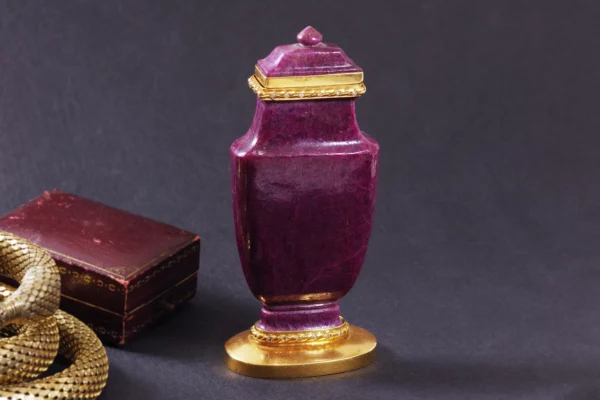
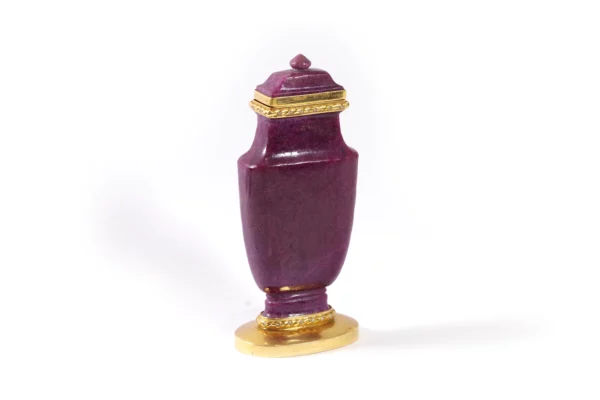 2500,00€
2500,00€Ruby diamond gold bottle vase with 18k yellow gold setting. This small covered pot is intricately carved from a ruby root and features a mount made of 18k yellow gold on the neck, lid, and base. The neck and base are adorned with a frieze set with 32 diamonds of varying cuts (a mix of old and brilliant cuts). This is a decorative object from the 20th century with foreign craftsmanship. It is stamped with the owl hallmark.
Dimensions: 11 x 4.5 cm
Estimated weight of the ruby: 1050 carats
Total estimated diamond weight: 0.32 caratsNote: This vase comes with a certificate issued by the Public Service for the Control of Diamonds, Fine Pearls, and Gemstones, dated September 21, 1998.
Weight: 208.11 gr
-
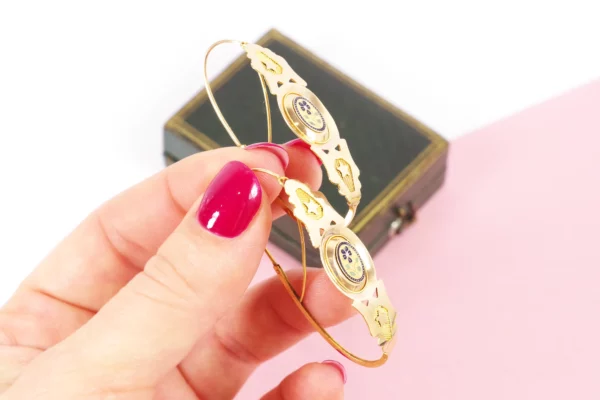
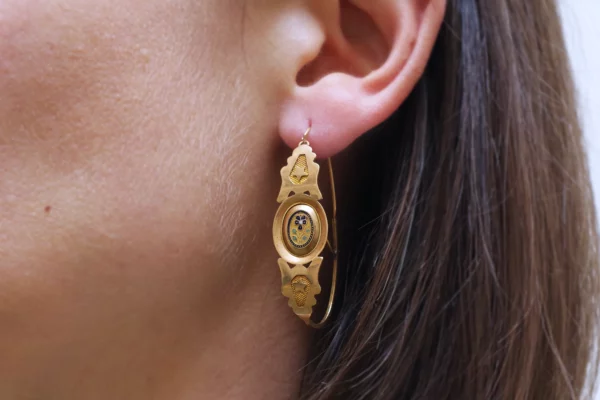 2400,00€
2400,00€Large enameled poissardes earrings in 18 karat rose gold (750). These substantial poissarde earrings are centered with a blue, green, and white enameled pansy, surrounded by a midnight blue enamel frieze punctuated with gold dots. The main motif is framed by two stars on a painted gold background. Poissardes, circa […]
